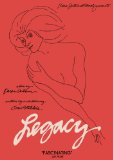| Reviews & Columns |
|
Reviews DVD TV on DVD Blu-ray 4K UHD International DVDs In Theaters Reviews by Studio Video Games Features Collector Series DVDs Easter Egg Database Interviews DVD Talk Radio Feature Articles Columns Anime Talk DVD Savant Horror DVDs The M.O.D. Squad Art House HD Talk Silent DVD
|
DVD Talk Forum |
|
|
| Resources |
|
DVD Price Search Customer Service #'s RCE Info Links |
|
Columns
|
|
|
Legacy (1975)
A fascinating look at a deeply troubled woman's psyche. Scorpion Releasing (always something unusual coming from them) has released Legacy, the 1975 filmed adaptation of Joan Hotchkis' one-woman play, starring the playwright in the lead role. Considered by some to be a landmark entry in feminist moviemaking back in '75, Legacy's then-edgy impact is bound to be blunted 36 years later; however, seen in context, it's still an involving, disturbing work. A surprising amount of extras (including two commentary tracks) are included here, making this release quite attractive for those receptive to the subject matter.

In what may be transpiring over the course of one day...or a week or a month (or with no time frame at all for the disturbed Bissie's mind), Legacy looks at the complete mental collapse of Bissie Hapgood (Joan Hotchkis). A rich, bored California housewife obsessed with neatness and order and to-do lists, Bissie fills her days talking endless blather on the phone with her friends, or visiting in the morning with her elderly, infirmed mother (for whom Bissie has unmistakable, yet closely guarded, hostility), or executing completely worthless tasks such as tracking down some misplaced Christmas ornaments she plans on using for a dining room table centerpiece. Sexually frustrated (even masturbation proves unsatisfactory to the repressed Bissie), and married to an insensitive husband she probably doesn't love (George McDaniel, in flashbacks), Bissie finds initial solace (and then swift regret and torment) in memories of past loves (Sean Allan, in flashback), as well as pain from unpleasant memories regarding her life with her husband and children. Preparing for a dinner party that evening (a party that may only exist in her mind), Bissie discovers more missing butter knives from her silver set, pushing her over the edge into a complete breakdown...and perhaps, redemption.
SPOILERS WARNING
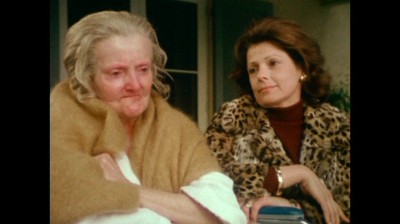
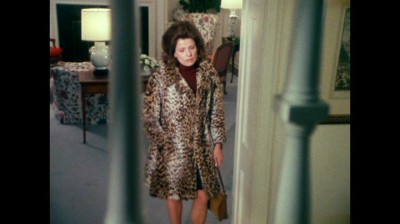
Admittedly, I only know Joan Hotchkis' work from television, with her turn as Oscar Madison's sometime girlfriend, Dr. Nancy Cunningham, on The Odd Couple, the one role that springs immediately to mind (boy am I going to watch that relationship differently now...). I had never heard of Legacy prior to getting this disc, so I was coming to the film and the performer fairly clean. The two or three loyal readers who regularly click on my reviews might be surprised to see me watching something like Legacy; admittedly, The Love Boat and Mannix it ain't. However, as I've stated in many of my reviews, I've always had a soft spot for indie films (at least from this time period), so something like Legacy, which sounded like it came from the same territory as one of my favorites, John Cassavettes (A Woman Under the Influence, specifically), found a receptive reviewer here.
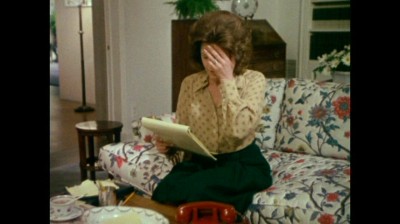
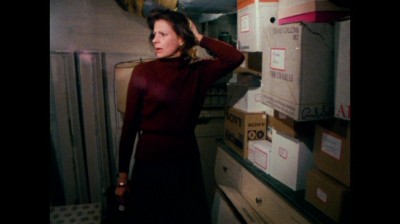
Overall, I found Legacy quite compelling. Of course, it's getting more and more difficult for seasoned viewers to register much surprise at "groundbreaking" moments in films like Legacy because we've been exposed to these once-controversial themes and concerns for decades now. Legacy may indeed have been "groundbreaking" as its creators claim for having the first on-screen masturbation sequence or a frank discussion of clitoral arousal (I'd question that first assertion), but its central theme of a woman's emotional breakdown and sexual dysfunction amid the impersonal trappings of a materialistic world, wasn't an unknown concept in 1975 (they're obviously different in focus and tone, but 1970's Diary of a Mad Housewife immediately comes to mind, and you could make a case for Blanche Dubois' sexually-driven madness in A Streetcar Named Desire, too). I'll leave it to feminist cinema historians to hash out Legacy's place and importance to that canon (I'm certainly no expert on the subject), but leaving behind its historical context (as surely as any new viewer will do, coming fresh to the movie), Legacy works well as a sometimes harrowing trip inside the mind of an unrealized, tormented woman.
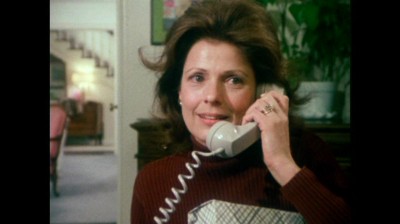
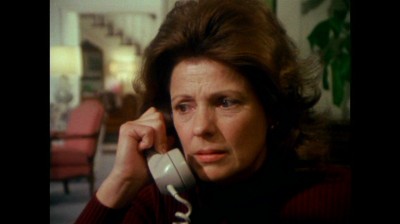
Karen Arthur, in her debut as a director, is quite disciplined in keeping the focus squarely on Hotchkis' performance (Arthur can do no wrong in my book for directing one of my favorite schlocky TV movies: the epic The Jacksons: An American Dream―I watch it every time it's on VH1...which is like, once a week). In her director's commentary, Arthur gets down on herself for relying almost exclusively on long, long, unbroken takes, with many of them in tight close-up. However, I agree with Hotchkis' judgment (in her separate commentary track), that this technique works well to preserve the theatrical nature of the piece. As well, it serves to rivet the audience to Bissie's self-absorption and her problems. Arthur's camera (with the aid of cinematographer John Bailey) is restrictive, certainly...but so is her subject, and Arthur's obsessive need to keep Hotchkis in frame as she dangerously rambles on, is a good marriage of form and content.
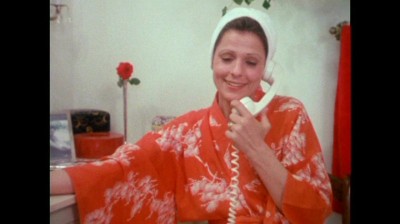

As for that "content," according to Hotchkis' commentary track, she felt Bissie's personal problems were as much a result of class dynamics and race, as they were interior psychosis. Labeling Bissie a "typical WASP" from Smith College, Hotchkis laments the upbringing of these "externally focused, internally fogged" women who are "bred to marry our country's White leaders." That's a fairly nutty―and racist―generalization, particularly because it's based on her individual perceptions of her similar childhood. That's hardly a theory based on rigorous sociological study, nor does it take into account the myriad different upbringings, parental influences, economic factors, and just plain "X factor" phenomenon that affects how someone grows up (not to mention it completely discounts numerous other intangibles of human existence such as free will and genuine spirituality, while employing an overwhelmingly negative take on human behavior as a whole...at least in upscale White households―the easiest, safest target to hit). No one would seriously look at a Stepin Fetchit movie and postulate that he represents all African-Americans' belief systems and modes of behavior from that time period, but Hotchkis states categorically that Bissie represents all those girls like herself who were raised the same, exact way. That kind of monolithic generalizing seems to be endemic to ideologues, and it certainly sounds good in term papers and on commentary tracks, but it's problematic, at best, as an all-encompassing "truth"―particularly when it's used with such dismissive scorn to denigrate an entire group of people.
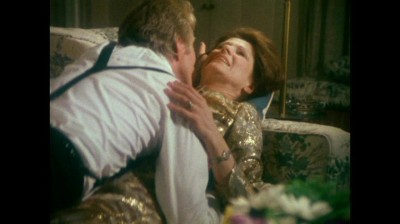
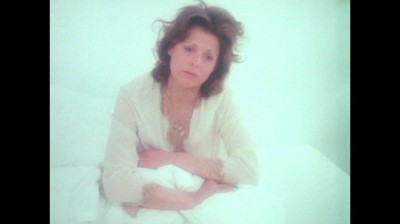
It may be more rewarding to view Legacy as a "straight" psychological drama (minus the suspect race-based sociology), one informed by feminist concerns, because on that level, Legacy succeeds quite well. Hotchkis and Arthur are particularly good at creating an increasingly palpable sense of madness (through the mise-en-scene and Hotchkis' building performance) as Bissie becomes more erratic, more unhinged, as the true reality of her life comes crashing down around her. After failing to see her own mean-spirited behavior towards the mother she can't forgive (deliberately embarrassing and angering her mother with a discussion of menstruation, Bissie sighs, "Well...that's over," before she comments on how she has to "peel" her mother off her when she leaves), the false accoutrements of Bissie's lifestyle are stripped away by one. She panics when she can't find the Christmas ornaments she needs; she seems genuinely hurt when her friend on the other end puts the phone down without telling her; and she rails about the imperfections of her foreign help. Trying to fall back on herself, she can't find pleasure either in her memories of past loves (the one man she truly loved she abandoned, because he was diabetic and she didn't want to be married to an "invalid"), nor her marriage (her husband is portrayed as an insensitive heel who refuses to satisfying her sexually, and who is thoughtlessly cruel to her and their son).
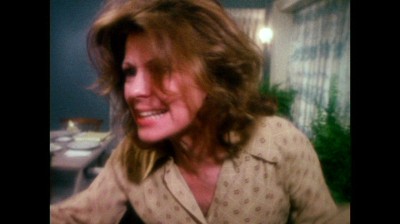
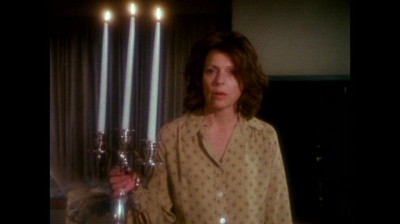
She can't even masturbate to a satisfactory conclusion; she feels guilt and shame and nothingness after it, so repressed is she concerning her body and her own sexual and emotional needs. Even science doesn't help; she finds no comfort from her psychiatrist, either ("I've been going to you for four years...and nothing's changed!"). Unable to get her bearings because all of her social and personal frameworks are crumbling, she devolves into total breakdown when the last straw is applied: her beautiful butter knives are missing, mangled in the garbage disposal by a maid (a maid who isn't there). Alone in her house, Bissie weeps for death to take her. Hotchkis takes Bissie right to the edge of audience acceptance...and goes over it with a vulgar, racist rant that is as shocking to the audience as it is damaging to the character. But interestingly, Hotchkis is so skilled that even when presented with such a disagreeable character, we ultimately find immense sympathy for Bissie when we see how empty and self-hating her interior life is. Hotchkis is fearless as the troubled Bissie, presenting a pretentious, mean-spirited woman who gradually becomes more spaced-out before she flips entirely, breaking down into uncontrolled hysteria and finally, near-catatonia. It's a balls-out performance, without fear or pretense, and one that single-handedly carries Legacy.
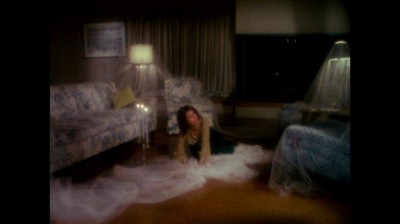
The DVD:
The Video:
Originally shot on 16mm, this anamorphically-enhanced 1.33:1 full-screen transfer has been taken from a 35mm blow-up and formatted to a 16 x 9 palette. Scratches and minor dirt specs are noticeable, but they're infrequent, while the soft, gauzy cinematography seems correct for the time and subject matter (it is disconcerting to hear the director say in her commentary track that she's watching a transfer that's too bright and blown out: is that this transfer she's referring to, or a different one?).
The Audio:
The English mono audio track is entirely adequate for the job; the re-recording level is strong, and hiss is minimal. No close-captions or subtitles are provided.
The Extras:
Two commentary tracks are included, featuring the director and the screenwriter/lead actress. Lots of dead space for Hotchkis' track, and some questionable sociology, but she's obviously pleased with the film, and her affection for the film is notable. Arthur, well-spoken and engaging, had some good points to make about the production of the film, and it's funny to compare where director and actress diverge in memory; for instance, Hotchkis says her mother never swam in the nude, but Arthur claims Legacy's arresting opening image did come from Hotchkis' childhood memories. However, right at the end of the commentary track, when Arthur made a point of specifically thanking "art house cinema audiences who have the patience and intelligence to be able to sit and allow a piece like this to play itself out," she lost me. It's that kind of elitist attitude that drove me right out of "film history" academia. I know this guy on my bus, and we talk "cinema" all the time...except we call it "movies," and even though he doesn't know "mise-en-scene" from his *sshole, he's right 99 out of a 100 times on why a movie is good or not. He wouldn't be caught dead in an "art house" theater, but he got to the core of Bergman once―without using any of the terms―that blew me away. "Intelligent art house" audiences aren't the only ones who "get" movies, Ms. Arthur. I'm sorry...I mean, the "cinema." Anti-elitist rant over. Also included are three substantial interviews with Hotchkis (33:29), Arthur (45:01), and editor Carol Littleton and cinematographer John Bailey (18:00). Lots of interesting insights here (to say the least with Hotchkis) and solid background on the film's production.
Final Thoughts:
Legacy is a compelling, deeply-felt look at the emotional breakdown of a severely repressed woman. A landmark, apparently, in feminist filmmaking, Legacy works because of the relentlessly obsessed lensing of director Karen Arthur, and the fearless performance by Joan Hotchkis. A surplus of extras helps Legacy come highly recommended.
Paul Mavis is an internationally published film and television historian, a member of the Online Film Critics Society, and the author of The Espionage Filmography.


|
| Popular Reviews |
| Sponsored Links |
|
|
| Sponsored Links |
|
|
| Release List | Reviews | Shop | Newsletter | Forum | DVD Giveaways | Blu-Ray | Advertise |
|
Copyright 2024 DVDTalk.com All Rights Reserved. Legal Info, Privacy Policy, Terms of Use,
Manage Preferences,
Your Privacy Choices | |||||||









